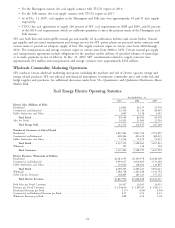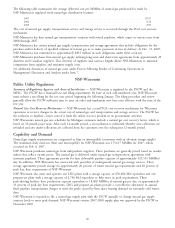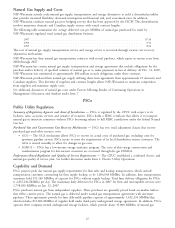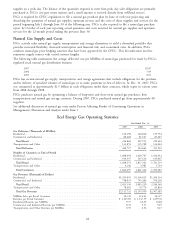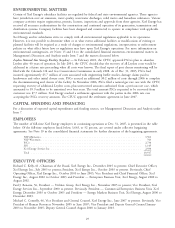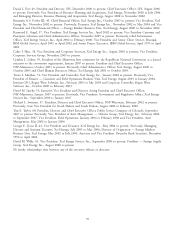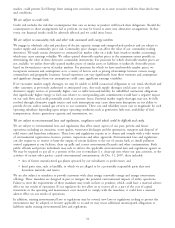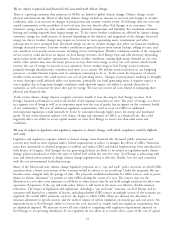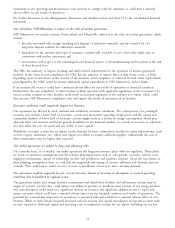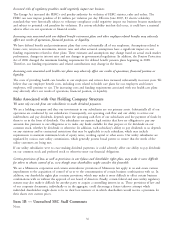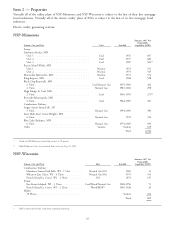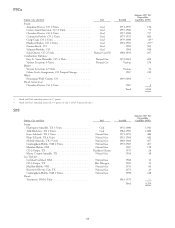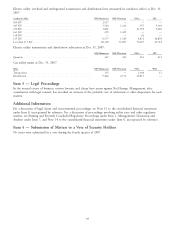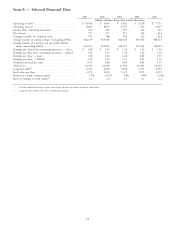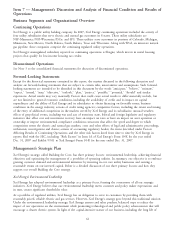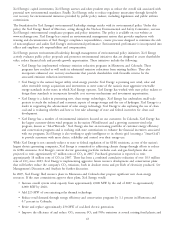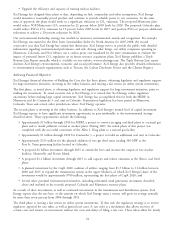Xcel Energy 2007 Annual Report Download - page 44
Download and view the complete annual report
Please find page 44 of the 2007 Xcel Energy annual report below. You can navigate through the pages in the report by either clicking on the pages listed below, or by using the keyword search tool below to find specific information within the annual report.investment or the operating and maintenance costs incurred to comply with the mandates, it could have a material
adverse effect on our results of operations.
For further discussion see the Management’s Discussion and Analysis section and Note 15 to the consolidated financial
statements.
Our subsidiary, NSP-Minnesota, is subject to the risks of nuclear generation.
NSP-Minnesota’s two nuclear stations, Prairie Island and Monticello, subject it to the risks of nuclear generation, which
include:
• the risks associated with storage, handling and disposal of radioactive materials and the current lack of a
long-term disposal solution for radioactive materials;
• limitations on the amounts and types of insurance commercially available to cover losses that might arise in
connection with nuclear operations; and
• uncertainties with respect to the technological and financial aspects of decommissioning nuclear plants at the end
of their licensed lives.
The NRC has authority to impose licensing and safety-related requirements for the operation of nuclear generation
facilities. In the event of non-compliance, the NRC has the authority to impose fines or shut down a unit, or both,
depending upon its assessment of the severity of the situation, until compliance is achieved. Revised safety requirements
promulgated by the NRC could necessitate substantial capital expenditures at NSP-Minnesota’s nuclear plants.
If an incident did occur, it could have a material adverse effect on our results of operations or financial condition.
Furthermore, the non-compliance of other nuclear facilities operators with applicable regulations or the occurrence of a
serious nuclear incident at other facilities could result in increased regulation of the industry as a whole, which could
then increase NSP-Minnesota’s compliance costs and impact the results of operations of its facilities.
Economic conditions could negatively impact our business.
Our operations are affected by local, national and worldwide economic conditions. The consequences of a prolonged
recession may include a lower level of economic activity and uncertainty regarding energy prices and the capital and
commodity markets. A lower level of economic activity might result in a decline in energy consumption, which may
adversely affect our revenues and future growth. Instability in the financial markets, as a result of recession or otherwise,
also may affect the cost of capital and our ability to raise capital.
Worldwide economic activity has an impact on the demand for basic commodities needed for utility infrastructure, such
as steel, copper, aluminum, etc., which may impact our ability to acquire sufficient supplies. Additionally, the cost of
those commodities may be higher than expected.
Our utility operations are subject to long term planning risks.
On a periodic basis, or as needed, our utility operations file long term resource plans with our regulators. These plans
are based on numerous assumptions over the relevant planning horizon such as: sales growth, economic activity, costs,
regulatory mechanisms, impact of technology on sales and production and customer response. Given the uncertainty in
these planning assumptions, there is a risk that the magnitude and timing of resource additions and demand may not
coincide. This could lead to under recovery of costs or insufficient resources to meet customer demand.
Our operations could be impacted by war, acts of terrorism, threats of terrorism or disruptions in normal operating
conditions due to localized or regional events.
Our generation plants, fuel storage facilities, transmission and distribution facilities and information systems may be
targets of terrorist activities that could disrupt our ability to produce or distribute some portion of our energy products.
Any such disruption could result in a significant decrease in revenues and significant additional costs to repair and
insure our assets, which could have a material adverse impact on our financial condition and results of operations. The
potential for terrorism has subjected our operations to increased risks and could have a material adverse effect on our
business. While we have already incurred increased costs for security and capital expenditures in response to these risks,
we may experience additional capital and operating costs to implement security for our plants, including our nuclear
34


